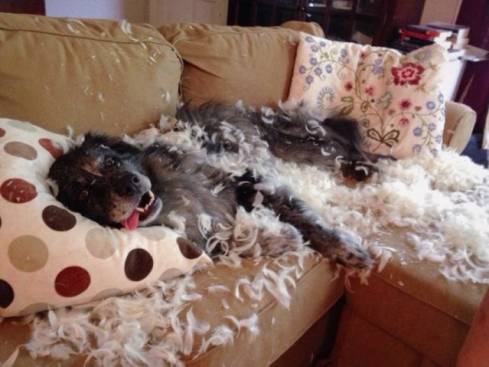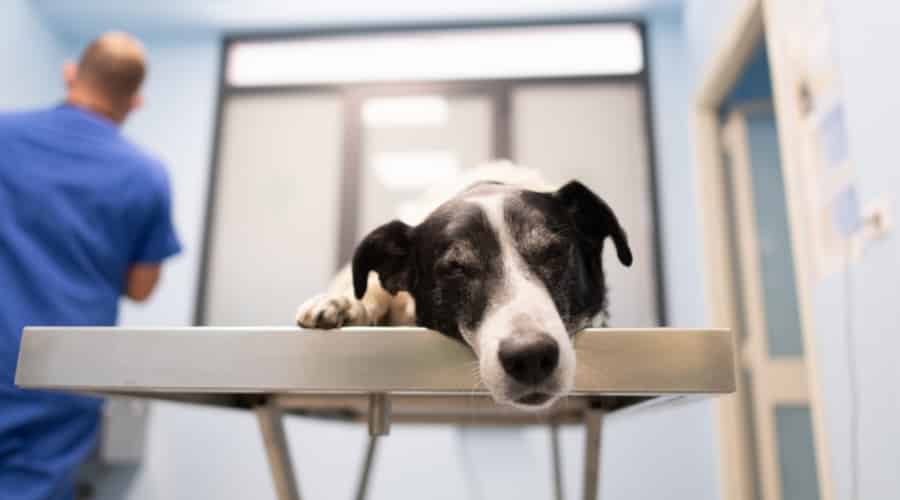Connect with a verified veterinarian in minutes. Licensed vets are available 24/7 to answer your questions. No need to worry about your furry family member.
It can happen—dogs love to chew on all types of things, including furniture like the couch! You may leave for work in the morning and then come home in the evening only to find foam everywhere. It can look like a tornado’s gone through your home! Imagine the stuffing from one couch strewn everywhere!
That’s not a pretty picture! But what happens if your dog eats some of the couch foam? Will the couch foam make your dog sick?
What is Couch Foam Made Of?
The foam in your couch is made with chemicals that can be very dangerous. The foam is called polyurethane and contains polyol, which is a type of alcohol. It also contains diisocyanate, which is a petroleum product. These products can be toxic if swallowed.
However, there’s another serious problem for dogs that ingest this foam. If the dog eats enough of the foam, there’s a chance he could develop an intestinal obstruction. This is because the foam can become compacted in the digestive tract, and then cause a blockage. This is a very serious medical condition.
What if My Dog Eats Couch Foam?
If your fur baby eats a small piece of the foam, chances are he will be just fine. He may vomit and/or have diarrhea. You’ll want to monitor your dog for any concerning symptoms. Also, check your dog’s poop to see if the foam has come out. If you don’t see it in a daythen you should go ahead and call the vet.
On the other hand, if your dog eats a large amount of couch foam, then you’ll want to call the vet immediately. Your dog is in danger of developing an intestinal obstruction.

Review symptoms, medications & behavior to keep your pets healthy with a Vet Online in just minutes.
Ask a Vet Live NowSymptoms of an Intestinal Obstruction in Dogs
You may notice these symptoms if your dog has eaten couch foam:
- Vomiting
- Diarrhea
- Constipation
- Excessive drooling
- Abdominal pain & swelling
- Loss of appetite
- Lethargy
If you know or suspect your dog has eaten a large amount of couch foam, and/or if he develops any of these symptoms, then call the vet immediately. This could be a life-threatening medical emergency. Your dog needs treatment now.
While an intestinal blockage can be life-threatening, fast treatment can save your dog’s life. This is why it’s essential to contact your vet as soon as possible.
Treatment of Couch Foam Ingestion in Dogs
The vet may give your dog a gastroprotectant that protects the delicate tissues in the digestive system. These medications can also stabilize bleeding in the digestive tract.
On the other hand, if your dog is showing symptoms of an intestinal blockage, the vet may need to do X-rays or an abdominal ultrasound to see where the blockage is located.
If the vet finds the foam, they will more than likely perform surgery to remove the couch foam from your dog’s digestive system. They will also repair any damage the foam may have caused.
Esophageal Obstruction
Another common problem that may occur when a dog eats couch foam is esophageal obstruction. This condition is similar to an intestinal blockage, except that the obstruction occurs in the throat or esophagus.
Esophageal obstruction can be just as dangerous as an intestinal blockage. This type of obstruction causes blockage to the dog’s airways. However, a dog could swallow foam and still be able to breathe if it’s stuck in his esophagus. But if the item becomes lodged in the back of the mouth or the upper part of the throat, it may put pressure on the windpipe, leading to severe breathing problems.
Symptoms of Esophageal Obstruction in Dogs
- Gulping repeatedly (trying to swallow the foam)
- Gagging, retching, coughing
- Vomits but nothing comes up
- Lack of appetite & doesn’t attempt to drink
- Smacking of the lips
- Drooling excessively
- Pawing at the mouth or face
- Lethargy
- Pain when moving the head or neck
If your dog shows any of these symptoms, it’s best to call the vet right away.
Treatment of Esophageal Obstruction in Dogs
Most vets prefer an endoscopic procedure to remove the blockage from the dog’s esophagus. In some cases, surgery may be required to remove the blockage.
It’s not always possible to keep your dog from eating the couch, but you may want to consider leaving him in a room that doesn’t contain furniture when you need to leave him alone! You may also want to talk with the vet about the possibility of your dog having separation anxiety. There are treatments the vet can suggest that may help your dog feel better and keep him from being destructive.
Connect with a verified veterinarian in minutes. Licensed vets are available 24/7 to answer your questions. No need to worry about your furry family member.

Aisling O'Keeffe, MVB CertSAM ISFMCertAdvFB
This article has been reviewed and approved by an independent Veterinarian: Aisling qualified as a vet 7 years ago from University College Dublin. She has worked in a mixture of UK small animal hospitals along with Irish practices. She worked for 3 years in a feline-only hospital where she further developed her feline medicine and surgery skills. She currently lives and works in a small animal hospital in Cork, Ireland.
Review symptoms, medications & behavior to keep your pets healthy with a Vet Online in just minutes.
Ask a Vet Live Now






